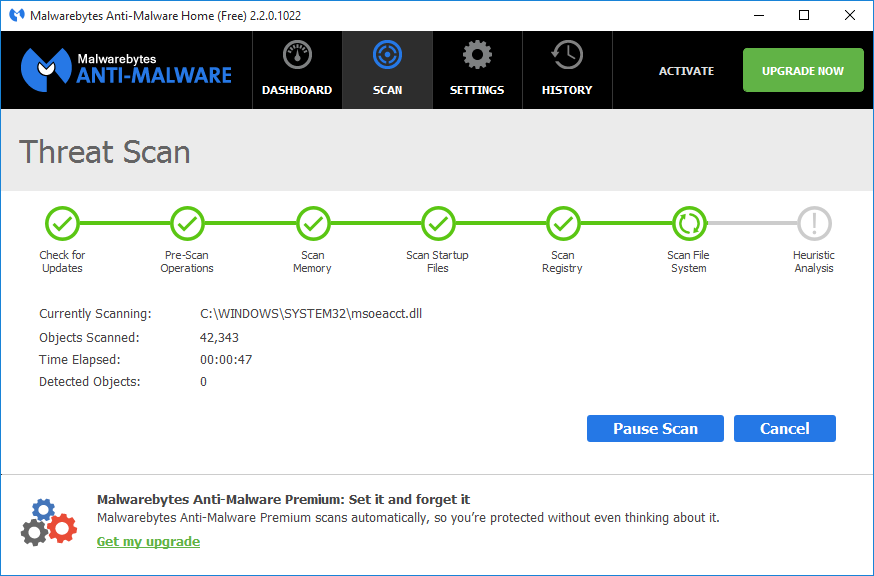
Malwarebytes Anti-Malware Free Trial And
Get started today with free trial and remove Spyware, Rootkits, Spyware, Adware.We set out to do a standard Wirecutter guide to the best antivirus app, so we spent months researching software, reading reports from independent testing labs and institutions, and consulting experts on safe computing. Malwarebytes Anti-Malware Premium crushes these threats with innovative technologies designed to defend you hile keeping your online experience fast and hassle free.SUPERAntiSpyware protects you against malware, ransomware, and spyware. Todays cyber criminals build software designed to slip past antivirus programs undetected. Innovative anti-malware beats criminal software that steals your money and online life.



Technically, all viruses are a kind of malware, but not all pieces of malware are viruses.So why shouldn’t you install a full antivirus suite from a known brand, just to be on the safe side? For many good reasons: In contrast, antivirus is an out-of-date term that software makers still use because viruses, Trojan horses, and worms were huge, attention-getting threats in the 1990s and early 2000s. Although antivirus firms constantly update their detection systems to outwit crypting services, they’ll never be able to keep up with malware makers intent on getting through.A quick terminology primer: The word malware just means “bad software” and encompasses anything that runs on your computer with unintended and usually harmful consequences. Why we don’t recommend a traditional antivirus suiteIt's insufficient for a security app to just protect against a single set of known “viruses.” There is a potentially infinite number of malware variations that have been crypted—encoded to look like regular, trusted programs—and that deliver their system-breaking goods once opened.
Good security is not free, and free-to-download apps are more likely to collect data about your computer and how you use it and to sell your private browsing data, as well as to install browser extensions that hijack your search and break your security and add an advertisement to your email signature.For these reasons, we don’t recommend that most people spend the time or the money to add traditional antivirus software to their personal computer. Privacy: Free antivirus software has all of the above problems and adds privacy concerns. Performance: Antivirus software is notorious for slowing down computers, blocking the best security features of other apps (such as in the Firefox and Chrome browsers), popping up with distracting reminders and upsells for subscriptions or updates, and installing potentially insecure add-ons such as browser extensions without clearly asking you for permission. As TechRepublic explains, “Security software necessarily requires high access privileges to operate effectively, though when it is itself insecure or otherwise malfunctioning, it becomes a much higher liability due to the extent to which it has control over the system.” Symantec and Norton, Kaspersky, and most other major antivirus vendors have all suffered from critical vulnerabilities in the past.
People with sensitive data to protect (medical, financial, or otherwise), or with browsing habits that take them into riskier parts of the Internet, have unique threats to consider. Do not make your IT department’s hard job even more difficult. Organizations have systemwide security needs and threat models that differ from those of personal computers, and they have to account for varying levels of technical aptitude and safe habits among their staff.
In any case, Windows Defender routinely performs as well in lab tests as any paid third-party antivirus software, and when a major vulnerability was discovered in Windows Defender in May 2017, Microsoft was remarkably fast with the fix—from a Friday-night disclosure to a Monday-evening patch.No antivirus software consistently receives perfect scores from every test lab, every month, in every test, but Windows Defender typically does as well as (or better than) the competition, it’s free, and it’s enabled by default. Windows Defender rebounded in AV-Test’s December tests, fixing those real-world testing issues and catching 100 percent of the attacks. But having layers of security and good habits—especially sticking to official app stores and not downloading questionable free versions of things you should pay for, as we cover in another blog post—should keep you safe from the worst kind of Defender-defeating malware.AV-Test dinged Windows Defender in protection back in September 2019 due to its failure to catch some zero-day malware attacks. Windows Defender does have the problem of being the default detection app that malware makers first attempt to work around. It doesn’t install browser extensions or plug-ins for other apps without asking. The AV-Test Institute’s independent testing gave Windows Defender a recommendation in December 2019, and a nearly perfect rating in performance.Because Windows Defender is a default app for Windows 10, by the same company that makes the operating system, it doesn’t have to upsell you or nag you about subscriptions, and it doesn’t need the same kind of certificate trickery to provide deeply rooted protection for your system.


 0 kommentar(er)
0 kommentar(er)
